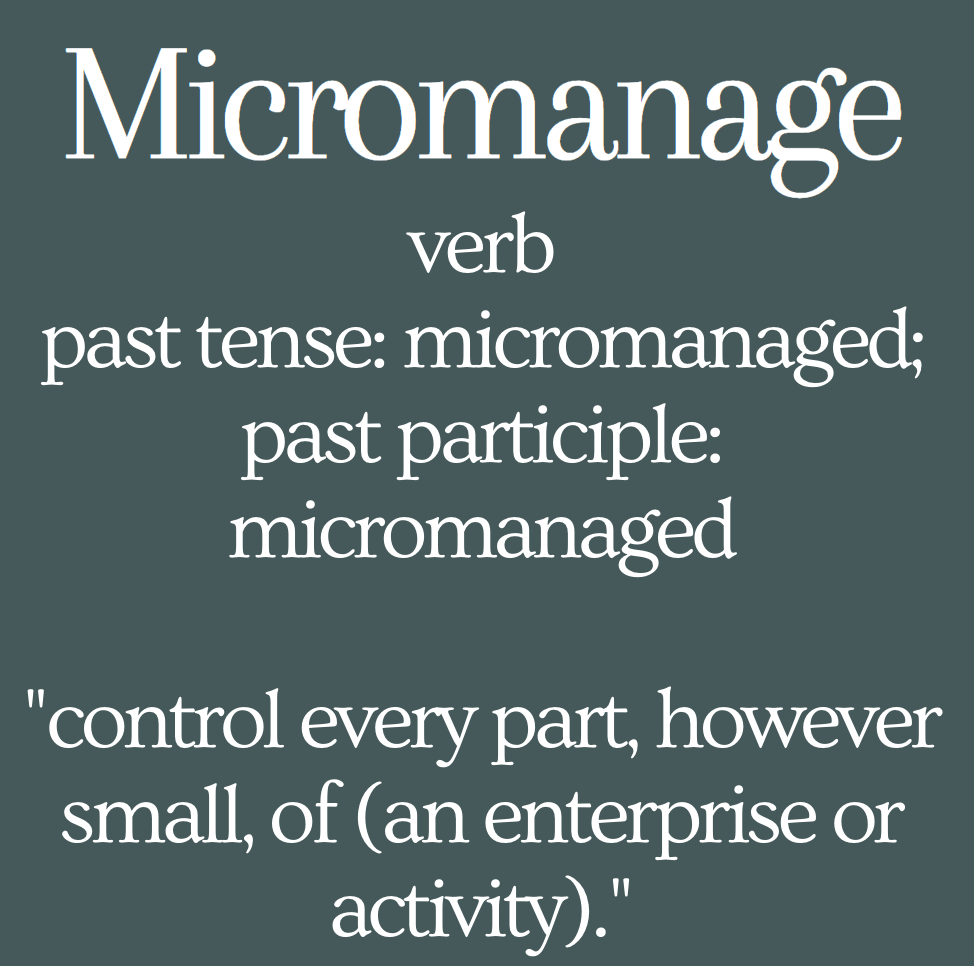Micromanagement: The Chronic and Toxic Illness Spreading Throughout Company Cultures
Micromanagement — I’m calling it what it is: a chronic and toxic illness often found in places of work where employees whisper about it, internalize it, but often live in terror of what it would mean to speak up and say something about micromanagement and its emotional turmoil … especially to a micromanager.
There I said it, but now that it’s out in the open — let’s have a real conversation. I promise you, the statistic that I’m about to share is absolutely not going to shock you whatsoever: 69% of employees want to get the hell out of their job — even if they love the work they do — if they identify their direct boss or manager as a micromanager. If you Google the word “micromanager” or the phrase “my boss is micromanaging me,” the articles, think pieces, message board posts highlighting horror stories, and never ending Reddit threads one upping each other about micromanaging VPs and CEOs are endless. And while there is a surplus of data and information about micromanagement out in the world, the only real solution that exists seems to be the one where the employee, the non micromanager, has to leave (or as I like to say, GTFO).
Not all micromanagers are created equal, but most have a lot of similarities like avoiding delegation, asking teammates to constantly pull reports for no real reason at all, letting nobody except for themselves make decisions, withholding skills, knowledge, or information from those that could actually benefit from it, constantly finding something wrong with everything, spending too much time focused on meaningless details, and my personal favorite — the inability to finish anything (projects drag on forever, campaigns never get off the ground, processes keep going through the same review system over and over and over and over again).
However, it’s clear to me that there are three types of specific micromanagers that my friends, family, and even myself have ran into:
The one who tells you over and over again they aren’t a micromanager, especially when you never asked if they were: These micromanagers truly believe the information they are offering up is the right way, the only way of doing something and since they are too focused on being right and not seeing anything from a different perspective — they expect the work to be done exactly the way they want it done (and they usually give little to no context, examples, advice, help, or support around what that specific way is). These types of micromanagers like to describe themselves as laid back and chill, the cool manager, but when it comes to reviewing the document you put together for them — their laidback attitude goes out the window and things usually get icy cold and passive aggressive.
The ones who have to have their hands in everything, always: Micromanagers are the types of people who can’t just approve the social content calendar copy and let it be. Oh no, these micromanagers — despite approving the copy and raving about its excellence and perfect themes — usually feel inclined and emboldened to go into the Instagram post after it's been up for 7 hours to put their own personal spin on the caption (the one written weeks ago) without any rhyme or reason to do so. They can’t just let the work of other people stand on its own because they are terrified that if someone else gets praise for the original copy, they, the micromanager, can’t say they were responsible for it. By having their hands in as many projects as possible, these micromanagers have the most opportunity to show their supervisors and VPs that they are ahead of the curve despite actually being out of touch from the literal work itself.
The ones who have roles where they are responsible for creating and sharing strategies but when it comes time for them to present and share their work — they’ve got nothing: Of course these micromanagers have no strategies, tactics, quarterly plans, one-sheet guidelines, or creative updates to share with the people they manage because they have been too busy going into Photoshop and reworking an ad campaign a Creative Director spent 18 hours on and they were just way too busy to think of driving revenue on social because they were more invested in spending time as a community moderator in an Instagram thread on a Thursday morning despite having a full team of community moderators who get paid to do exactly that. These types can’t focus on their own work because they are all-consumed with what everyone else is doing and they sure as hell are focused on making their teams do it their way.
Out of all the reasons my friends and past colleagues have shared with me in the last year about why they have left their last job or two — micromanagement is nearly the first answer I hear. One friend of mine had to have every single email of hers read by her boss before it was sent to anyone — even internal peers. Another friend of mine had to pull Excel files with data and then do the math by hand for her boss to prove that she set the Excel formula up correctly and the numbers were right. The hours doing this manual math for hundreds of rows of work is enough to blow your mind.
While I’ve had a variety of bosses with different personalities and firm expectations, I will never forget the ultimate micromanager I encountered. Let’s call her … Evin. From my very first day at the job, a fintech startup, to my last day — Evin tried to micromanage every single thing I did and did it with a coy, girl-next-door, overly eager to be your friend type way. Sometimes she would even make comments about how much coffee I drank or if I had more than one Coke Zero for the day, as if she — a Content Lead — was also the director of my fluid intake. Whether I was writing a blog or working with a designer on a major holiday creative project, no matter what Evin signed off on and told me I had the green light to move forward with … she had to put her mark on everything and usually insisted upon doing this during the 11th hour. This behavior was exhausting, but most of all — it was demoralizing.
“Last time I checked, being someone’s boss doesn’t mean you get a free pass to gaslight them and micromanage their work unless you have concerns about the quality of what they are producing. ”
When I told Evin I wasn’t happy with the lack of autonomy in my role that was promised during my interview process, she told me I had 100% autonomy and it was all in my head that I perceived to not have it at that moment. After pulling email examples and Instagram screenshots to show exactly what I was talking about — she blushed and said “Well, I’m your boss and I can do these things.” Last time I checked, being someone’s boss doesn’t mean you get a free pass to gaslight them and micromanage their work unless you have concerns about the quality of what they are producing. When I asked Evin how I could do a better job to keep her less occupied with my every move, she said my performance was top-notch but didn’t plan to change her management style.
Call me crazy, but when you’re hired for a certain role or skill set — I don’t think wanting to be able to have the autonomy to perform that role and skill set should be considered radical. Even now as a full-time freelancer, I occasionally run into micromanagers. However, the beauty of working for myself is being able to clearly articulate boundaries, what is acceptable, and what behaviors I will not tolerate within my business values and schedule. Since freelancing is different because you don’t often have that face-to-face experience, navigating expectations and reality is easier than doing so in a traditional 9am to 5pm office space.
Ultimately, unless an employee is not performing or meeting goals, no manager should breathe down their back. This behavior is toxic and it’s no surprise that it’s causing millennials to look for new jobs on the regular. It’s one thing to set clear expectations and hold employees to them, but when a boss goes behind an employee's back to do their job for them for no reason at all or changes something without even communicating it — we need to call it what it is: an abuse of workplace power. And it needs to stop.



